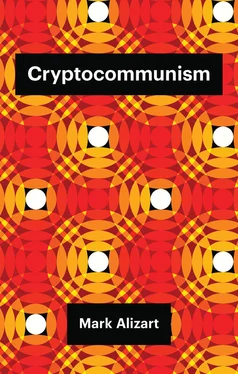1 Cover
2 Front Matter Cryptocommunism Mark Alizart Translated by Robin Mackay polity
3 Introduction: The Institution of Liberty Notes
4 Part I Government of People, Administration of Things 1 A State without Statism Notes 2 Cybernetics and Governmentality Notes 3 From Democratic Centralism to Decentralized Consensus Notes 4 Fully Automated Blockchain Communism Notes
5 Part II Collective Appropriation of the Means of Monetary Production 5 Thermocommunism Notes 6 The Monetary Institutions of Capitalism Notes 7 Fool’s Gold Notes 8 Everyone’s a Banker Notes
6 Part III A New International 9 Collectivist Intelligence Notes 10 The Resurrection of Nature Notes 11 Leviathan 2.0 Notes 12 Living Currency Notes
7 Conclusion: Cryptoletarians of All Countries Notes
8 End User License Agreement
1 Cover
2 Contents
3 Begin Reading
1 ii
2 iii
3 iv
4 v
5 ix
6 1
7 2
8 3
9 4
10 5
11 6
12 7
13 9
14 11
15 12
16 13
17 14
18 15
19 16
20 17
21 18
22 19
23 20
24 21
25 22
26 23
27 24
28 25
29 26
30 27
31 28
32 29
33 30
34 31
35 32
36 33
37 34
38 35
39 36
40 37
41 38
42 39
43 40
44 41
45 43
46 45
47 46
48 47
49 48
50 49
51 50
52 51
53 52
54 53
55 54
56 55
57 56
58 57
59 58
60 59
61 60
62 61
63 62
64 63
65 64
66 65
67 66
68 67
69 68
70 69
71 70
72 71
73 72
74 73
75 74
76 75
77 76
78 77
79 78
80 79
81 81
82 82
83 83
84 84
85 85
86 86
87 87
88 88
89 89
90 90
91 91
92 92
93 93
94 94
95 95
96 96
97 97
98 98
99 99
100 100
101 101
102 102
103 103
104 104
105 105
106 106
107 107
108 108
109 109
110 110
111 111
112 112
113 113
114 114
115 130
Theory Redux series
Series editor: Laurent de Sutter
Published Titles
Mark Alizart, Cryptocommunism
Armen Avanessian, Future Metaphysics
Franco Berardi, The Second Coming
Alfie Bown, The Playstation Dreamworld
Laurent de Sutter, Narcocapitalism
Roberto Esposito, Persons and Things
Graham Harman, Immaterialism
Helen Hester, Xenofeminism
Srećko Horvat, The Radicality of Love
Dominic Pettman, Infinite Distraction
Nick Srnicek, Platform Capitalism
Mark Alizart
Translated by Robin Mackay
polity
Copyright © Mark Alizart 2020
This English edition © Polity Press, 2020
Polity Press
65 Bridge Street
Cambridge CB2 1UR, UK
Polity Press
101 Station Landing
Suite 300
Medford, MA 02155, USA
All rights reserved. Except for the quotation of short passages for the purpose of criticism and review, no part of this publication may be reproduced, stored in a retrieval system or transmitted, in any form or by any means, electronic, mechanical, photocopying, recording or otherwise, without the prior permission of the publisher.
ISBN-13: 978-1-5095-3859-1
A catalogue record for this book is available from the British Library.
Library of Congress Cataloging-in-Publication Data
Names: Alizart, Mark, author.
Title: Cryptocommunism / Mark Alizart ; translated by Robin Mackay.
Other titles: Cryptocommunisme. English
Description: Cambridge, UK ; Medford, MA : Polity Press, [2020] | Series: Theory redux series | Includes bibliographical references and index. | Summary: “The communist manifesto for the age of Bitcoin”-- Provided by publisher.
Identifiers: LCCN 2020004522 (print) | LCCN 2020004523 (ebook) | ISBN 9781509538577 (hardback) | ISBN 9781509538584 (paperback) | ISBN 9781509538591 (epub)
Subjects: LCSH: Communism and technology. | Cryptocurrencies--Philosophy. | Value--Philosophy.
Classification: LCC HX543.5 .A4513 2020 (print) | LCC HX543.5 (ebook) | DDC 332.4--dc23
LC record available at https://lccn.loc.gov/2020004522LC ebook record available at https://lccn.loc.gov/2020004523
The publisher has used its best endeavours to ensure that the URLs for external websites referred to in this book are correct and active at the time of going to press. However, the publisher has no responsibility for the websites and can make no guarantee that a site will remain live or that the content is or will remain appropriate.
Every effort has been made to trace all copyright holders, but if any have been overlooked the publisher will be pleased to include any necessary credits in any subsequent reprint or edition.
For further information on Polity, visit our website: politybooks.com
Communism = Soviets + Electricity
Lenin
My thanks first of all to Laurent de Sutter, for the trust he placed in me by accepting this book into his collection. I would also like to express my gratitude to John Thompson and Polity Press, to my translator Robin Mackay, and to the readers who agreed to reread my manuscript and helped guide my thinking: Brune Compagnon-Janin, Anthony Masure, Aliocha Imhoff and Kantuta Quiros, Mathieu Potte-Bonneville, as well as Odile Lakomski-Laguerre, Jacques Favier and Adli Takkal Bataille.
Introduction: The Institution of Liberty
Cryptocurrencies are often deemed ‘revolutionary’ and, indeed, Bitcoin’s manifesto shares striking similarities with the most prominent revolutions in history. Satoshi Nakamoto’s vision that it is possible to trade without bankers as intermediaries cannot but remind us of Martin Luther’s claim that believers can entertain a direct relationship with God without priests as intermediaries, which in 1517 kickstarted the Protestant Reformation. It has a similar feel to the declarations of Oliver Cromwell, George Washington and Maximilien de Robespierre, according to which the people can govern themselves without princes as intermediaries, declarations that gave rise to the great political revolutions.
Obviously, the Bitcoin ‘White Paper’ doesn’t tell us how to obtain eternal life like the Reformation did, and the petty calculations of small investors worried about their savings seem to have little in common with the struggle for liberty, so one might well doubt whether any of this goes beyond a vague resonance, and whether Bitcoin really promises the same kind of disruptions as those earlier revolutions. But it would be a great mistake to overlook cryptocurrencies because they are just about ‘money’. Finance is anything but trivial. The economy is not only a fundamental aspect of our societies; in some senses it is the continuation of the religious and political spheres by other means.
Holy communion wafers are shaped like coins because originally both were cast in the same moulds. 1The first ‘central banks’ in history were founded in reformed countries; financial engineering required ‘trust’, above all, trust being just another word for ‘faith’. 2By placing faith ( fides ) and guilt at the centre of religious life, Protestantism allowed associates who trusted one other ( con-fide ) to give each other ‘credit’ ( crede , ‘to believe’) for their debts (moral as well as financial). It was a Protestant, John Law, who introduced the first paper money into France at the beginning of the eighteenth century. 3And it is also the Protestant concept of faith, in the sense that implies trust and letting go, and therefore being free , that supported the construction of liberal democracies and allowed them to emancipate themselves from monarchy.
Читать дальше












